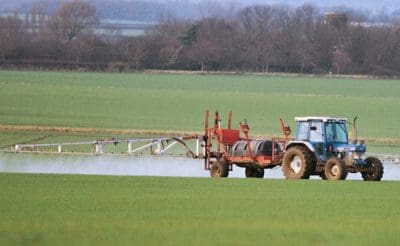CALLS for a ban in Europe of the widely-used, non-selective herbicide, glyphosate, have sparked fears of far-reaching consequences for global food producing and exporting nations such as Australia.
 With the licence for glyphosate due to expire in Europe on December 15 and authorities yet to reach agreement on the chemical’s future, the issue is fast coming to a head.
With the licence for glyphosate due to expire in Europe on December 15 and authorities yet to reach agreement on the chemical’s future, the issue is fast coming to a head.
The European Union (EU) Parliament on Tuesday last week passed a non-binding motion to ban the herbicide by 2022. It followed a presentation to the EU of a petition signed by 1.3 million people calling for the ban.
The motion blindsided the European Commission which was due to meet the following day to discuss extending glyphosate’s licence for up to 10 years. At the Wednesday meeting, member states of the Commission couldn’t agree on the term of an extension and no vote was taken (see Grain Central story).
They are due to meet again next week to thrash out a decision on the herbicide’s future.
Australia’s Grain Producers Association chairman, Andrew Weidemann, said a ban on glyphosate in Europe would have serious consequences for Australian farmers if Australian regulators were to follow suit.
“The bigger ramification is that if one country bans glyphosate there is potential flow on for other countries to look to do that on a political whim,” he said.
“I think that in terms of loss to Australian agriculture, without glyphosate we will be in a world of pain. There will be nowhere near the production we have and a lot of people would just walk away from farming.
“…..if one country bans glyphosate there is potential flow on for other countries to look to do that on a political whim.”
“It has been such a revolutionary product and we have found new and novel ways to use it over the last 20 years.”
Mr Weidemann said the impact of a glyphosate ban on European farming systems and production would be massive.
“Without glyphosate they will have to go back to broadacre cultivation because it will be the only means farmers have to control weeds pre-sowing,” he said.
“Farmers there have real fears they will lose it and the public is not aware of the impact that will have on their agriculture. It is understated just how significant it will be.”
Science, not ideology
GrainGrowers CEO, David McKeon, said the campaign to have glyphosate banned in the EU was driven by political and ideological agendas, when it should be based on scientific grounds.
“In Australia as an industry and society we strongly back a scientifically-based and risk-based regulatory system which underpins everything from the use of chemicals to a whole range of other regulatory systems, such as biosecurity,” he said.
“The EU has a different system for chemicals that uses a hazard-based regulatory system which is inherently different and doesn’t take into account how the product is used or otherwise.
“The other key element is the politicisation of glyphosate in the current case. It is unfortunate that decisions being made on the future of glyphosate aren’t being made on a robust, scientific, risk-based assessment but are being made on the basis of political views.”
Lessons for Australia
Mr McKeon said whichever way the issue played out, there were lessons for Australia.
“Either way, it highlights the importance of having a key consideration of where consumers are at, and where some of our international markets are at, with the use of plant protection and chemical products. It is important for us to be cognisant of that,” he said.
“Even though from a regulatory and science-based perspective we deem the use of glyphosate as absolutely necessary for our modern farming practices, there are some sectors of the community who hold a different view.
“We need to be cognisant of that in a market context as well. Even if the Europeans do agree to extend the use of glyphosate, it reminds us to remain ever vigilant about the views of the community and the end-users of our products.
“Secondly, if they do go to a situation where they ban the use of glyphosate, that would trigger a whole range of far-reaching concerns from fundamental changes in market acceptance of residue limits and products, and the application of various chemicals.
“That also fundamentally causes huge ramifications for modern agricultural production systems built around moisture, conservation of soil and efficient allocation of resources. A lot of farming systems are built around the use of a small amount of chemicals such as glyphosate.”
Mr McKeon said the issue also reminded Australian farmers to be ever vigilant about managing herbicide resistance strategies and using chemicals responsibly so they remain available for the long term.
“It also encourages us to continue investing in ‘non-drum’ solutions, looking at a range of strategies to manage weed and disease burdens that are a non-chemical, whole-of-farm solution,” he said.
Key export market
Mr McKeon said Europe was an important market for the Australian grains industry – despite the tyranny of distance – driven by the fact that it was Australia’s most significant canola export market.
“In the three years from 2014 to 2016, Australia exported an average of 1.8 million tonnes of grains, oilseeds and pulses to the EU, valued at US$770 million,” he said.
“Canola, at 1.6 million tonnes and US$700 million (A$907 million), contributes more than 90 per cent of Australia’s grain, oilseed and pulse trade with Europe.
“On average, Europe accounts for two-thirds of Australia canola exports, and in 2016 contributed 87 per cent of Australian canola exports. Belgium, Germany, France and Netherlands take virtually all Europe’s purchases of Australian canola.”
Global farmers
Australian Oilseeds Federation executive director, Nick Goddard, also called for the Europeans to base their decisions and regulations for agricultural chemicals on scientific evidence.
“From what we understand through the APVMA here and in the United States, glyphosate is safe to use at prescribed levels. The science and safety behind glyphosate is well demonstrated around the world,” he said.
“So, if the science is supporting its ongoing use, there should be no reason why it should be banned in one market and not another.
“I think there is another agenda at play in Europe around further tightening GM and Roundup Ready technologies.
“At the end of the day we are global farmers and these sorts of decisions, when there isn’t the science to support them, are unwarranted.”




Atrazine is another herbicide which regularly has been the target of criticism by various activists. Fortunately, due to pressure from the farming community and sensible analysis of scientific data by AVPMA, atrazine continues to be available as a herbicide in the recommendation list.